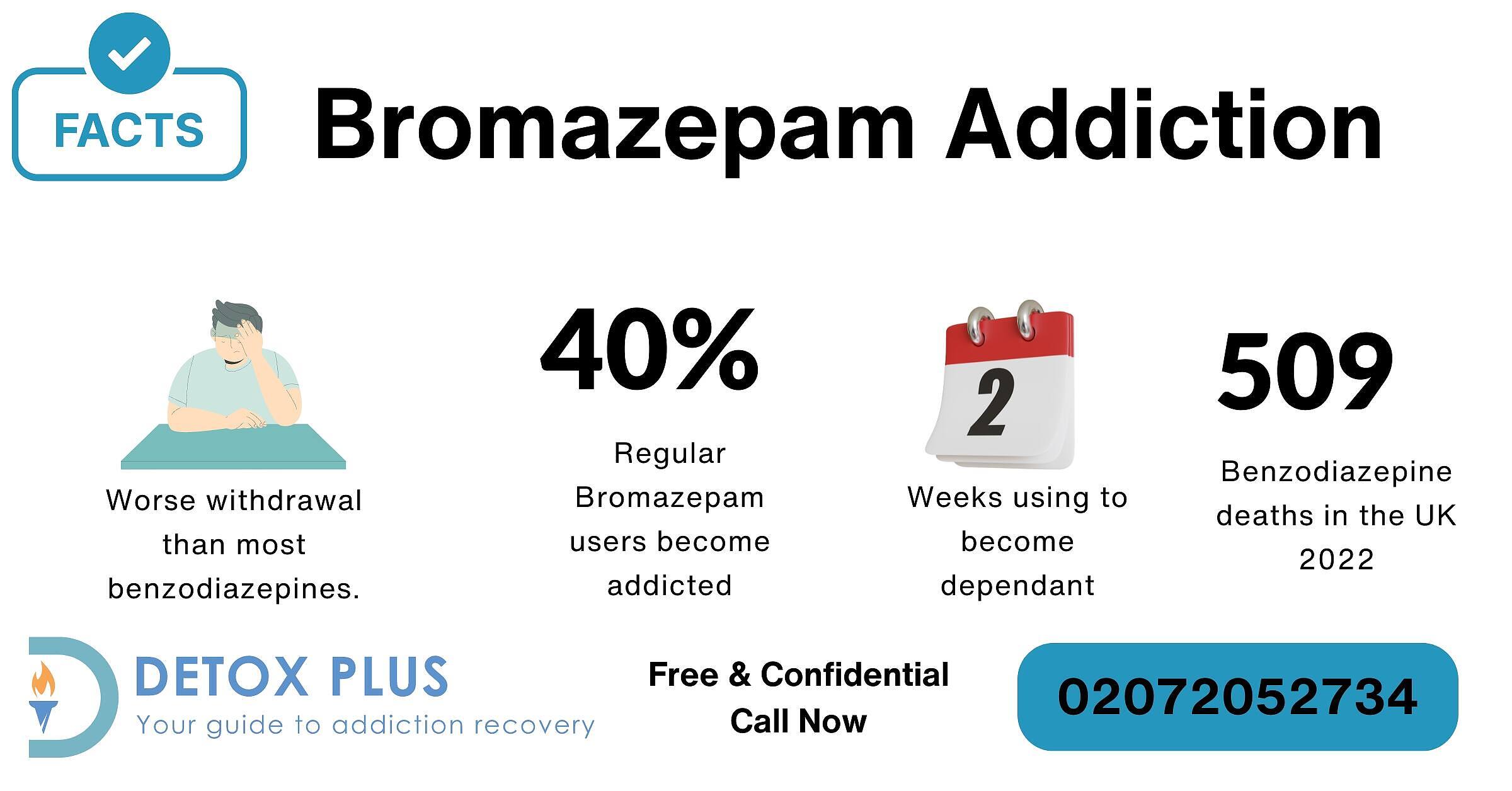
Bromazepam Addiction

Bromazepam is an anti-anxiety medication with similar effects to valium that can lead to abuse and addiction.
Bromazepam also has a high potency and is considered to have a greater abuse potential than many other benzodiazepines. This is because of its fast resorption rate and rapid onset of action.
Addiction to benzodiazepine medications is on the rise in the UK, mainly due to the ease of buying medications such as Diazepam, Bromazepam and Xanax online via the dark web. Last year, the British government reported a 6 % increase in the number of people entering treatment for a benzodiazepine addiction.
Here, we look at Bromazepam addiction, who should avoid taking it, and its risks and effects. Further on, we look at Bromazepam withdrawal symptoms and why, if you think you have a problem with Bromazpeman, you should seek professional help.
Table of contents
Tolerance, dependence & withdrawal
Mixing Bromazepam with other drugs
What is Bromazepam Addiction?
Bromazepam addiction, also referred to as Bromazepam use disorder, is a chronic condition represented by the uncontrolled and problematic use of the benzodiazepine medication Bromazepam.
Bromazepam belongs to the class of medications known as benzodiazepines. It is used for the short-term relief of symptoms of excessive anxiety. It can also be used as a pre-med for surgery within a hospital and to treat the symptoms of opiate or alcohol withdrawal,
Along with providing relief from anxiety symptoms, the drug has sedative, hypnotic, anxiolytic, and muscle relaxant properties, but it does not have any antidepressant effects.
In the UK, Bromazepam is a controlled Class C medication under the Misuse of Drugs Act 1971.
Brand names of Bromazepam include:
Brazepam, Bromaze, Lectopam, Lexotan, Lexilium, Lexaurin, Lexatin, Lexotanil, Rekotnil and Somalium
How Bromazepam works
Studies have shown that it lowers the release of catecholamines, including dopamine and adrenaline, in the brain. This, in turn, reduces levels of anxiety and calms brain activity.
However, this anti-anxiety action can also be associated with a reduction in 5-HTP (5-hydroxytryptamine).
5 HTP acts as a neurotransmitter and can be converted into serotonin within the body. Because of this, there may be a higher incidence of low mood and depression in a person taking Bromazepam.
Common side effects of Bromazepam Addiction:
| Drowsiness | Dizziness |
| Changes in appetite | Sedation |
| Constipation | Clumsiness |
| Delayed reaction time | Slurred or delayed speech |
| Headache | Tremor |
| Sleepiness | Seizures |
| Severe itching | Anaphylactic reaction |
Why Bromazepam is addictive

Bromazepam is considered to be potentially more addictive than other benzodiazepines, as it is short-acting with an intermediate onset. This also means that withdrawal symptoms are likely to occur sooner than with longer-acting benzodiazepines.
Bromazepam should only be taken for as short a time as possible.
No evidence suggests that taking Bromazepam for longer than two to four weeks is beneficial. On the contrary, taking Bromazepam for longer than this can lead to drug dependence and addiction.
Preventing Bromazepam addiction
You can prevent Bromazepam addiction by following your doctor’s prescription and heeding the warning signs.
- Bromazepam can be safely taken, but only for short periods.
- Discuss alternative medications with your doctor if you feel physically or psychologically dependent.
- Don’t take Bromazepam that is not authentically prescribed for you, e.g. illegal online tablets or a friend’s prescription.
The effects of Lexotan

Much like any other medication, Lexotanil can cause some unwanted side effects. These side effects can range from mild to severe.
Lexotanil affects different people differently. The effects of this benzodiazepine on a person cannot be predicted.
Some of the effects of Bromazepam, in rarer instances, can be dangerous or life-threatening. Because of this, you should always discuss any concerns you have with your doctor.
Help for Bromazepam Addiction
Being dependent on benzodiazepines is a terrifying place to be. Understandably, you will fear how you will cope without them and what to expect during detox.
Detoxing
Whilst detoxing from a benzodiazepine medication is one of the most challenging detoxes to undergo, it is entirely possible with the right medical help and therapy.
Therapy
Starting a rehab journey can be full of unknowns; however, finishing and completing addiction therapy or attending a rehabilitation programme can be the start of a new, exciting and infinitely better life.
Tolerance
As with all benzodiazepines, tolerance can develop quickly over a matter of a few weeks. When this happens, Bromazepam will not work so effectively. You may well be tempted to abuse the medication or seek an increase in your prescription if your original complaint has not been resolved. This is often the start of a very slippery road that can quickly spiral out of your control.
Dependence
Bromazepam addiction happens when your body and brain require the drug to be in your bloodstream to operate normally. Without it, you will suffer from benzodiazepine withdrawal symptoms. Additionally, you may find that you become psychologically dependent due to its calming effects on the brain.
Withdrawal
Withdrawal symptoms are more likely to occur if you have been taking Bromazepam for more than a few weeks. If you have been prescribed this medication for longer than a few weeks, your healthcare provider should help you to taper off.
If you have become dependent on Bromazepam through abusing it, never stop taking it suddenly. This could cause you to suffer life-threatening withdrawal symptoms. You will also be at an increased risk of developing PAWS (post-acute withdrawal syndrome) by stopping in this way.
Bromazepam withdrawal can be successfully and safely managed through a medical detox facilitated by a CQC-registered detox clinic or rehab facility.
Withdrawal symptoms from Bromazepam Addiction:
| Increased anxiety, nervousness and panic | Feelings of paralysis (catatonia) |
| Delirium tremens | Fast and irregular heartbeat |
| Extreme sweating | Confusion |
| Dysphoria: feelings of depression and sadness | Dissociation: feeling disconnected and out of touch with reality |
| Seizures and convulsions | Muscle cramps |
| Tremors | Stomach upset: nausea, vomiting, diarrhoea and pain |
| Hallucinations: seeing and hearing things that are not there | Mania: racing thoughts and erratic behaviour |
| Restlessness | Psychosis |
| Paranoia | Insomnia |
| Thoughts or actions of self-harm | Suicidal thoughts or actions |
Due to Bromazepam having a half-life of 8 to 12 hours, where a dependence has formed, withdrawal symptoms can start as soon as 8 to 12 hours after your last dose. In cases of chronic use, withdrawal can begin even more shortly. Abrupt cessation of Bromazepam, known as a cold-turkey detox, can lead to death.
Long-term effects of Bromazepam
Long-term use of Bromazepam is counterproductive. You may easily mistake withdrawal symptoms for increased symptoms of anxiety and depression.
When taken for prolonged periods or abused as part of an addiction, it can cause irreparable damage to the brain. This can result in a whole host of symptoms, including:
- Forgetfulness
- Cognitive decline
- Depression
- Behavioural changes.
Research has shown that Benzodiazepines can damage the cerebral cortex, which houses the brain’s functional areas for motor, sensory, and association. Motor areas control a person’s motor activities, while sensory areas receive sensory information.
The association, part of the brain, is mainly responsible for processing what happens between sensory input and the generation of behaviour in response. These damaging changes to the brain can also occur at therapeutic doses in the long-term use of benzodiazepines.
Taking Bromazepam with other drugs: Risks & Warnings
Bromazepam has depressant effects on the central nervous system. Therefore, it is hazardous to mix with other central nervous system depressants.
Mixing with alcohol, opioids, sleeping tablets, benzodiazepines, and even certain antidepressants will enhance the effects of both substances. Ultimately, this could lead to respiratory arrest, coma and death.
Taking Bromazepam regularly in conjunction with another substance also increases your risk of developing a dual addiction. This is especially true if you have ever created an addiction before or have an alcohol or opioid dependence.
It would be best to be careful when combining over-the-counter medicines with Lexotan. Some medications contain alcohol, codeine or other substances that will increase the effect of sedation when mixed with Bromazepam. Your pharmacist can advise you on which drugs to avoid and which are safe.
You should not drive or operate heavy machinery if Lexotan affects how alert you feel.
Bromazepam and alcohol

Alcohol is not safe to take with Bromazepam due to the increased effects of drunkenness and sedation that occur when the two are mixed. There is also a risk that you may accidentally overdose by combining the two.
Mixing Bromazepam and alcohol can result in the following:
- Decreased awareness of your surroundings
- Impulsive behaviours
- Risk-taking
- Increased risk of fall and injury
- Not recalling events that took place whilst under the influence (blackout)
- Respiratory depression and arrest
- Taking more than you intended and not realising
- Forgetfulness during intoxication
- Unsteadiness on your feet
- Slurred or incomprehensible speech
If you are taking Bromazepam for alcohol withdrawal, you mustn’t drink alcohol. Similarly, you should not take Bromazepam if you suffer from an untreated alcohol use disorder. This is not only a potentially lethal combination but can lead to a dual addiction to both alcohol and Bromazepam.
If you are in recovery from a substance use disorder, you should avoid this medication if at all possible. As your brain is already primed for addiction, you will be at a higher risk of developing Bromazepam addiction. Your healthcare provider can consider alternatives that will be safer for you.
Help for Bromazepam addiction and abuse
If you or a loved one have developed a dependence or addiction to Bromazepam, professional help and treatment are available.
Being dependent on benzodiazepines is a very scary place to be. Understandably, you will fear how you will cope without them and what to expect during a detox.
Whilst detoxing from a benzodiazepine medication is one of the most challenging detoxes to undergo, it is completely possible with the right medical help and therapy.

Detox Plus UK can custom plan your Bromazepam detox so that you receive around-the-clock medical care and therapeutic support. Our addiction treatment professionals will also look at the reasons why you developed an addiction or dependence in the first place and ensure that this is comprehensively addressed.
Starting a rehab journey can be full of unknowns; however, finishing and completing an addiction rehabilitation programme can be the start of a new, exciting and infinitely better life.
Call us today and chat with one of our friendly advisors. We are here to listen to your story and make the appropriate recommendations to help you on your path to recovery.
Common questions answered
How long does Bromazepam take to work?
Bromazepam usually takes around 1 hour to reach its optimum effects after consumption. These effects can last for several hours. The effects of Bromazepam can also increase over several days due to the accumulation of the drug in your system.
How does Bromazepam make you feel?
Bromazepam is likely to make you feel relaxed as it calms nerves and anxiety. It may also help you to sleep. You may experience euphoric effects and feel more content and happy. For some people though, this medication can have an adverse effect and increase symptoms of anxiety and restlessness.
How long can I take Bromazepam before becoming addicted?
Bromazepam should only be taken for as short a time as possible. No evidence suggests that taking the drug for longer than two to four weeks is beneficial. On the contrary, taking Bromazepam for longer than this can lead to drug dependence and addiction.
References:
- https://go.drugbank.com/drugs/DB01558
- Adult substance misuse treatment statistics 2020 to 2021: report
- Australian Government – Department of Health. Bromazepam”. Pharmaceutical Benefits Scheme (PBS).
- Ref: How does this medication work? What will it do for me?
- Effect of a new benzodiazepine bromazepam on locomotor performance and brain monoamine metabolism
- https://www.drugs.com/medical-answers/bromazepam-3569872/
- Ref: Bromazepam
- Chapter 1:The Anatomy of the Cerebral Cortex
- Brain Damage from Benzodiazepines

